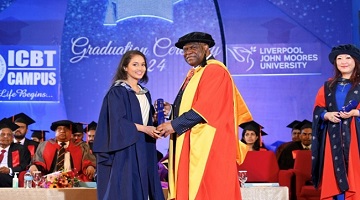2024/25 entry Applications also open for 2025/26
MSc Commercial Building Surveying | Part-time
About this course
All Commercial Building Surveying professionals will benefit from LJMU's RICS accredited Masters course, providing direct entry to the RICS APC training programme.
- Benefit from the internationally recognised research in our Built Environment and Sustainable Technologies (BEST) Research Institute
- Study on a course accredited by the Royal Institution of Chartered Surveyors (RICS)
- Select the part-time study option if you are already in employment
- Look forward to direct entrance on to the RICS APC professional training programme on graduation
- Network with industry professionals using our state-of-the-art learning technology
Designed as a conversion course for holders of non-cognate first degrees, this programme focuses on developing an awareness of technical, legal and management issues. Youll gain the professional and sound technical understanding required to operate successfully in a strategic business environment and youll be able to specialise in a subject of your choice during your dissertation.
All course lecturers are dedicated to providing the best opportunities to develop your skillset. Staff come from a variety of backgrounds and have years of industry experience to pass on to you. They also carry out internationally recognised research into various aspects of the discipline.
Indeed it is this research and our extensive links with professional bodies and employers, that ensure all of our postgraduate degrees are industry-focused, globally relevant and at the forefront of knowledge development in this field.
Throughout the course you will have the support of a personal tutor to provide you with one-to-one guidance and advice. On graduation you will have the professional accreditation and networks, in addition to the skills and techniques, to progress quickly in this dynamic field.
Fees and funding
There are many ways to fund postgraduate study for home and international students
Fees
The fees quoted at the top of this page cover registration, tuition, supervision, assessment and examinations as well as:
- library membership with access to printed, multimedia and digital resources
- access to programme-appropriate software
- library and student IT support
- free on-campus wifi via eduroam
Additional costs
Although not all of the following are compulsory/relevant, you should keep in mind the costs of:
- accommodation and living expenditure
- books (should you wish to have your own copies)
- printing, photocopying and stationery
- PC/laptop (should you prefer to purchase your own for independent study and online learning activities)
- mobile phone/tablet (to access online services)
- field trips (travel and activity costs)
- placements (travel expenses and living costs)
- student visas (international students only)
- study abroad opportunities (travel costs, accommodation, visas and immunisations)
- academic conferences (travel costs)
- professional-body membership
- graduation (gown hire etc)
Funding
There are many ways to fund postgraduate study for home and international students. From loans to International Scholarships and subject-specific funding, you’ll find all of the information you need on our specialist postgraduate funding pages.
Please be aware that the UK’s departure from the EU may affect your tuition fees. Learn more about your fee status and which tuition fees are relevant to you.
Employability
Further your career prospects
LJMU has an excellent employability record with 96% (HESA 2018) of our postgraduates in work or further study six months after graduation. Our applied learning techniques and strong industry connections ensure our students are fully prepared for the workplace on graduation and understand how to apply their knowledge in a real world context.
When you graduate with an MSc in Commercial Building Surveying you will be eligible for direct entrance on to the RICS APC professional training programme which can then lead to full Chartered status. Our graduates usually progress to professional training programmes and roles within construction organisations, public and private businesses.
The student experience
Discover life as a postgraduate student at LJMU.
News and views
Browse through the latest stories and updates from the University and beyond
Course modules
Discover the building blocks of your programme
Core modules
Dissertation
60 credits
This module develops and tests your ability to prepare a dissertation, based on the study of a subject related to your chosen discipline within the built environment. Dissertation preparation normally takes place after completion of the Postgraduate Diploma stage.
Research Methods
10 credits
This module focuses on your critical understanding of the research process. In preparation for your research study, it also develops skills in research design, implementation and presentation. You will come to understand the differing techniques, strategies and methods used to undertake research in the built environment.
Building Technology
20 credits
This module enables you to understand and evaluate the principles and techniques used in the construction of buildings. You will gain a critical understanding of the properties and performance of building materials required and will come to appreciate the importance and complexity of building construction and technology. You will also investigate the decision making process involved in specifying the correct materials and integrating appropriate building services, in accordance with approved building regulations.
Building Surveys and Dilapidations
20 credits
This module introduces the students to building surveying practice and enables students to develop a critical understanding and application of property surveys and inspections. To negotiate dilapidation claims through the interrogation of commercial property leases.
Sustainable Design Management
20 credits
This module aims to develop a strategic appreciation and critical application of sustainable and inclusive design for the refurbishment of commercial buildings aligned with regulatory and client requirements.
Building Management
10 credits
This module will provide you the opportunity to examine the process of acquiring property, and the effective management and maintenance of commercial property holdings.
Law for Surveyors
20 credits
This module aims to enable the students to develop knowledge and understanding of the legal and professional environment within which surveying practitioners operate. To develop a critical appreciation of legal principles governing ownership and occupation of land and property.
Collaborative BIM Project
20 credits
The module is an opportunity for students to follow BIM protocols and practice in a collaborative multidisciplinary project team to achieve project success.
Teaching
An insight into teaching on your course
Study hours
You can expect to spend around 12 hours each week in lectures.
Teaching Methods
You will learn via lectures, laboratory work, tutorials, workshops and practical sessions, combined with your own research using our library and the web.
Applied Learning
In addition to the School's extensive and long-standing links with the profession, this MSc course has its own direct links with industry through a special lectures programme, featuring a highly experienced team of practitioners from across the UK. This offers you great networking opportunities with key contacts along with the opportunity to engage with the latest thinking and practice in the sector.
Assessment
How learning is monitored on your programme
To cater for the wide-ranging content of our courses and the varied learning preferences of our students, we offer a range of assessment methods on each programme.
Assessment methods on this programme include: examinations, coursework (e.g. projects, technical reports, reviews), and presentations (individual and group).
Course tutors
Our staff are committed to the highest standards of teaching and learning
Dr Steffen Heinig
Programme Leader
Highly experienced in teaching leadership and programme management, Matthew's research in the field of facilities management culminated in winning a Fulbright Scholar Award which has gained international recognition. A highly regarded industry professional and a Chartered Surveyor with the Royal Institution of Chartered Surveyors, Matthew is Associate Editor of Facilities, one of the leading academic journals in the field of facilities management. Matthew's research interests include: facilities management; performance measurement; customer satisfaction; workplace productivity; sustainability and built environment education research.
I enjoy working with diverse and engaging students who are passionate about a career in the built environment. I like working with industry and academic leaders around the world to deliver cutting edge research projects that influence industry best practice and feed directly into teaching materials.
-
 Principal Lecturer
Principal Lecturer
School facilities
What you can expect from your School
This programme is based in the City Campus. Besides well-equipped workshops, we have: a structural testing laboratory, a concrete laboratory, a radio frequency and microwave laboratory, a highways research laboratory, an industrial chemistry laboratory, a soil mechanics laboratory, hydraulics laboratory, surveying laboratory, light structure and materials laboratory, building information modelling (BIM) software and expertise and smart homes.
Entry requirements
You will need:
Qualification requirements
Undergraduate degree
- a minimum 2:2 honours degree
or
- an equivalent professional qualification with appropriate work experience
International requirements
-
IELTS
- IELTS English language requirement: 6.5 (minimum 5.5 in each component)
Further information
- Extra Requirements
-
RPL
- RPL is accepted on this programme
Application and selection
Securing your place at LJMU
To apply for this programme, you are required to complete an LJMU online application form. You will need to provide details of previous qualifications and a personal statement outlining why you wish to study this programme.
The University reserves the right to withdraw or make alterations to a course and facilities if necessary; this may be because such changes are deemed to be beneficial to students, are minor in nature and unlikely to impact negatively upon students or become necessary due to circumstances beyond the control of the University. Where this does happen, the University operates a policy of consultation, advice and support to all enrolled students affected by the proposed change to their course or module.











